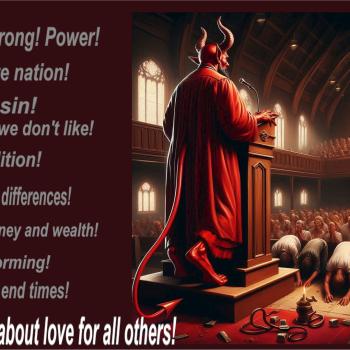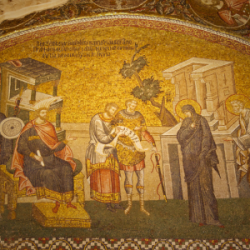Sunday our bishop (the title of a Mormon congregational leader) reminded us that, because of LDS General Conference, next Sunday rather than the first Sunday in October will be our Fast Sunday. Mormons are asked to fast one Sunday a month, usually the first one, and then to donate at least the amount they would have spent on meals during that fast to the care of the poor. As part of our fast, we are expected also to pray for ourselves and others, so that our fast aims at not only temporal blessings, but spiritual ones.
While giving his reminder, Bishop Christensen asked us to remember a woman in our congregation as we fast and pray. She has been having medical problems and would like our prayers on her behalf. At the same time, he reminded us that there are other people in the congregation whom we don't know about, but who suffer too. They too need our prayers; we ought to fast and pray for unseen as well as visible sorrow: things such as secret abuse, loneliness, delayed effects of trauma, admirable and reasonable but unattained goals, and some forms of mental illness.
Those who suffer are not only the obvious cases. In fact, sometimes those in obvious pain have problems other than what they tell us about—an inappropriate need for attention, for example, or hidden difficulties behind their public ones. Those are often no less painful, no less causes of sorrow, and they are often difficult for us to recognize and even more difficult for us to empathize with. Obviously those who suffer privately hide their sorrow, but even those who suffer publicly may do so.
Sorrow can be hidden because we don't want others to know. It can be hidden because the struggle to respond to our loss is primarily interior. Or it may be hidden because the sufferer may not be conscious of his sorrow, looking away from it to avoid it.
Most who live into adulthood know something about sorrow, hidden or otherwise. We know that it follows loss, whether the loss of a friend or loved one, the loss of innocence, the loss of a home to financial or natural disaster, the loss of opportunity, the loss of ability, the loss of others' respect. There are far too many losses over which we can reasonably sorrow.
We also know something of how sorrow takes its own course, often contrary to our will. We do not choose sorrow. It comes on us. And our most profound sorrows may eventually come to lie quiet, leaving us more-or-less alone, only to suddenly return unbidden, sometimes at inappropriate or inauspicious times.
Hidden sorrow is much like tinnitus. The tinnitus sufferer may be able to ignore the ringing she hears much of the time, a ringing no one else can hear. She may have strategies for doing so, or she may just be able to do so with little effort—who knows how? Then, without warning, the ringing can overpower every other sound she hears. It becomes the one thing she cannot ignore.
You would think that her brain would learn to filter out the ringing in her ears. But though the brain can learn to sometimes mask the hidden sound of tinnitus, it seems unable simply to make it go away. The same thing is true of sorrow. Merely exerting effort cannot change some things (Mt. 6:27).
We are generally aware of our own hidden sorrow. Yet we assume that we are, if not unique, at least uncommon. Part of what it means to suffer alone is to believe that we alone suffer. We see the cheery faces of others and assume that, unlike us, there is no sorrow in their lives. We live a contradiction: we continue on, while suffering, but we see others continuing on and take that as a sign that they are not in pain.
Like a symbol, suffering and sorrow express the nexus of the relations in which we find ourselves. They are not merely interior even if secret. They have their causes, but they also have their outward effects. Nevertheless we may not be able to solve the riddle of others' suffering or detect their sorrow and its origin. Were we sufficiently perceptive, we could see the lineaments and fault lines of both in their way of speaking, the things that attract their attention, the habits that identify them, in all the details of their lives. Rarely, however, do we know ourselves that well, much less others.
So we should assume that others sorrow and suffer. But our assumption ought not to be the kind to which everyone will quickly respond "of course," an affirmative, conscious recognition. Instead, it should be the kind of assumption that defines who we are, something implicit in our souls.
If our sorrow expresses our relations to others and the world, so does what we assume about the sorrow of others. If, merely by interacting with others, we see them as possibly suffering in sorrow, then we will live different lives than if we do not.





